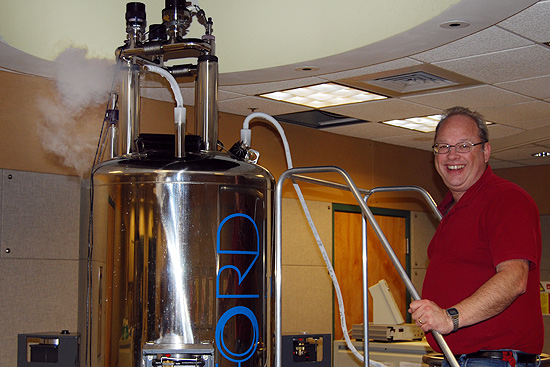Assistant Facilities Manager Ensures Chemistry Equipment Functions Properly
 |
| Doug Allen, assistant facilities manager in chemistry, fills a powerful spectroscopic instrument with liquid nitrogen in the basement of Hall-Atwater Laboratory. The spectrometer is used by chemistry and molecular biology and biophysics students for nuclear magnetic resonance experiments. |
| Posted 06/03/08 |
| Q: Doug, when did you begin your Wesleyan career?
A: I came to Wesleyan in 2002. Q: Youre currently the assistant to the facilities manager, Donald Albert. Together, what are your job objectives? A: Im very grateful that I can work with some one as generous with their time and talent as Don is. We are responsible for the Hall-Atwater/Shanklin Laboratory buildings. Chemistry, Biology and MB&B departments use these buildings intensively year round between the teaching and research laboratories. Don and I along with Horace Chambers (Biology and MB&B property specialist) make up the Academic Facilities support for the three departments. Q: What are the physical facilities within the Chemistry Department? A: The building infrastructure is dependent on the type of science being performed. Physical chemistry equipment tends to be large and heavy. Organic chemistry is performed in fume hoods. Theoretical chemistry is computer based. Biochemistry uses bench top space. We also have very specialized equipment that is shared. One of my duties is the cryogenic maintenance of the five NMR (nuclear magnetic resonance) instruments we have. Q: Do you have a background in chemistry? A: No. My degree was in business production/inventory control. Primarily I try to find the best utilization of resources in order to accomplish goals efficiently. Q: What goes on during a typical day? A: My duties will vary with the academic calendar. My primary function is to provide support to the chemistry undergraduate teaching labs. I coordinate the equipment and supplies for the labs. Another support function is to manage the sciences stockroom. We purchase common laboratory chemicals and supplies in bulk quantities to maximize savings. Q: Do you work with students or faculty? A: Mostly faculty, staff and graduate students. The graduate program supports the undergraduate program with teaching assistants while they also work in the faculty research labs. Its exciting to support the faculty in their research of new frontiers. Q: Youve been known to help out at liquid-nitrogen ice cream demonstrations and related experiments. That has to a bonus to your job! Do you try it every time? A: I help Professor Dave Westmoreland with some of the intro chemistry demonstrations. Demonstrations are such a great way to keep the material fresh and alive, plus the students really seem to appreciate it. I never get tired of ice cream. Q: What do you like best about working in the Chemistry Department? A: Its very challenging but also very rewarding. I interact with most of the people who work in the two buildings. The department encourages and supports professional development. Q: Where are you from? A: I was born in Baltimore, Maryland. My family moved to Guilford, Connecticut when I was 11. Somewhere along the line I started to think of myself as a Connecticut Yankee, although when Ive attended any town meetings, it seems a true Connecticut Yankee has to be a second or third generation to qualify. (I always think of the Newhart show Larry, Daryl and Daryl). Q: What are your hobbies, interests outside of work? A: My wife Cory Cullen and I live in Durham. Our three children will all be in college this fall. I spend my spare time with family and I also own a small wholesale business selling hobby hook-up wire to model train stores nationwide. |
| By Olivia Drake, The Wesleyan Connection editor |

